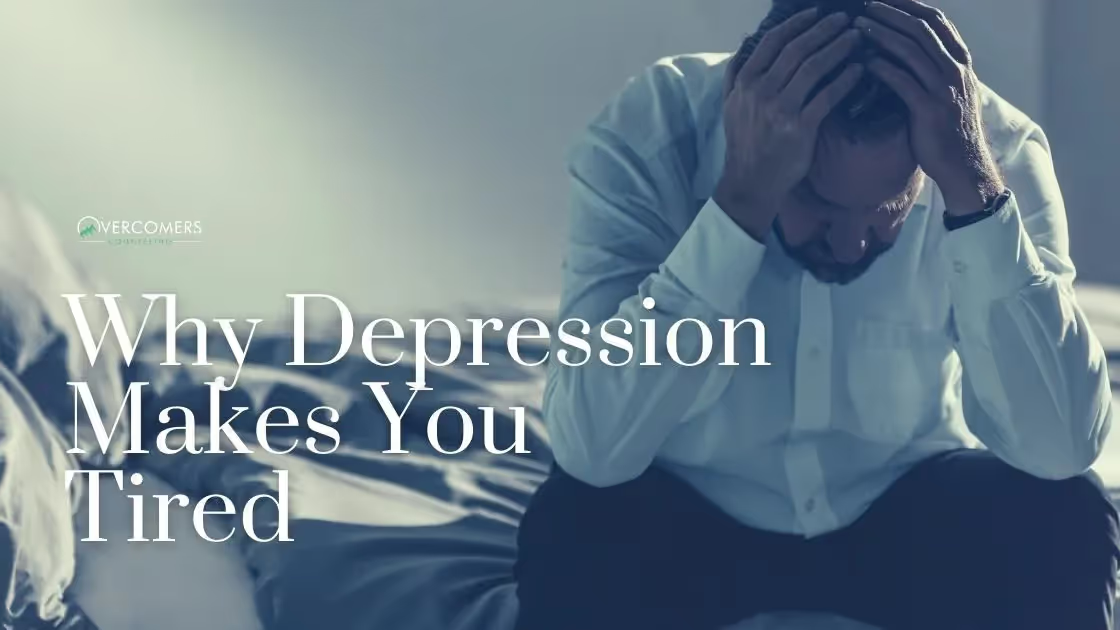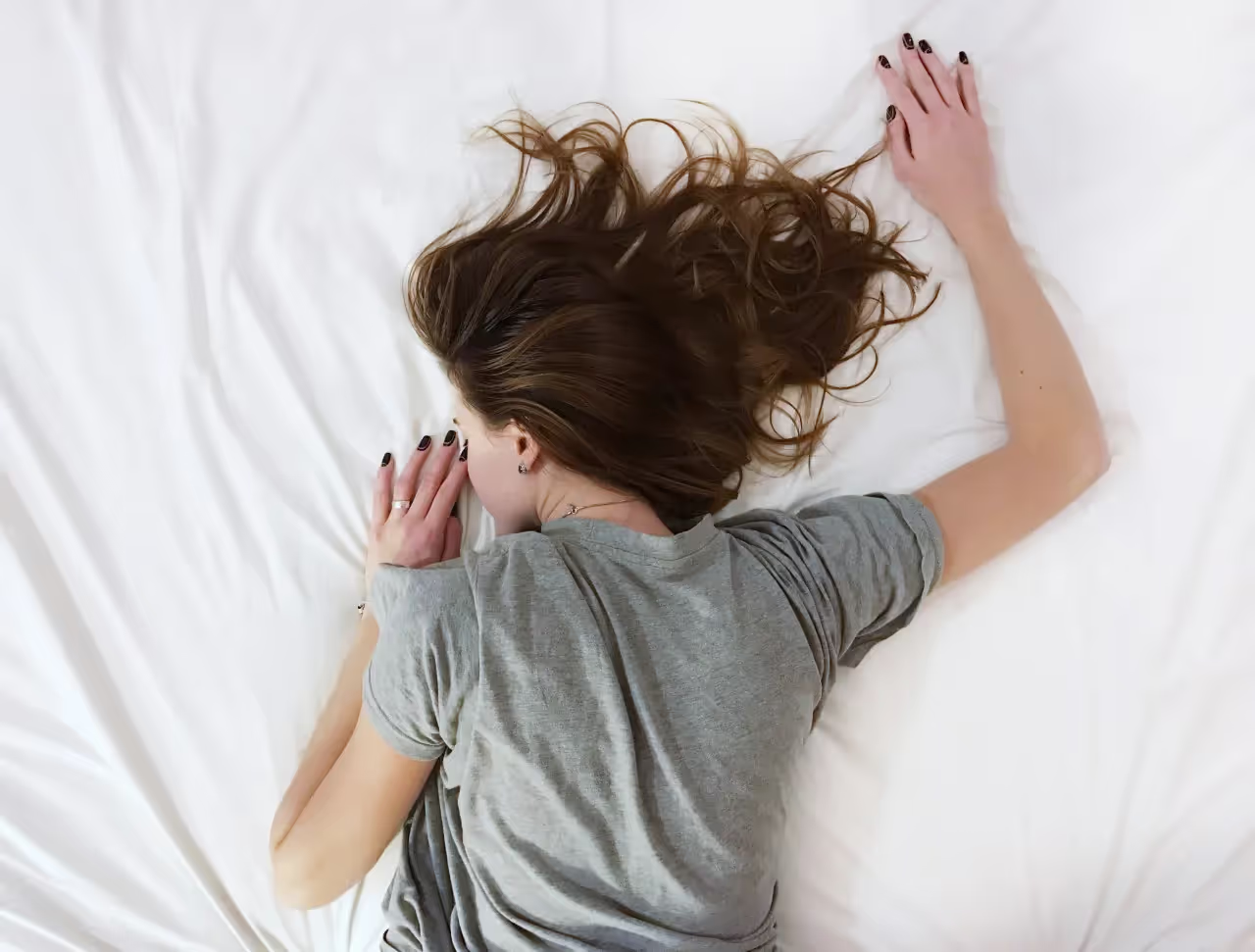Fatigue, body aches, lack of motivation, and other effects of depression might have you wondering why depression makes you tired.Research shows that up to...

Fatigue, body aches, lack of motivation, and other effects of depression might have you wondering why depression makes you tired.
Research shows that up to 24% of adults in the United States struggle with depression.
That means that depression is probably much more common than you think.
Despite being so common, depression is still very misunderstood.
The symptoms that people most commonly associate with depression are emotional.
Symptoms like persistent sadness, loneliness, despair, and other negative emotions.
However, depression also has more physical symptoms like exhaustion and fatigue, changes to appetite and sleeping patterns, and even physical pain.
One often overlooked symptom is how depression can make you feel tired.
If you've found yourself feeling tired often, lack energy, sleeping more, or experiencing fatigue: this could be depression.
Depression is often thought of as an emotional or mental illness, but it also has physical effects.
These effects often contribute to feeling tired.
There is a clear link between depression and inflammation.
Researchers are unsure of which causes which, but people who are depressed are also highly-likely to also be inflamed.
Inflammation activates your body's stress response and also lowers your immune system.
Your body being in a constant state of red alert due to inflammation caused by depression can make you tired.
Depression is also linked to lower oxygen levels in the body.
Research suggests that depression causes you to actually breathe more shallow than normal.
Breathing less deeply results in less oxygen taken into your body, your bloodstream, and your brain.
When you're oxygen deficient your body starts to experience effects like dizziness, reduction in brain function, and a sluggish body.
This means that not breathing deeply enough might also be making you tired.

One of the most common symptoms of depression is an increase in sleeping or a need for more sleep.
If you're having a lot of trouble waking up in the morning, find yourself sleeping through your alarm clock more often, or falling asleep at strange times, then you might be suffering from depression.
Changes in appetite due to depression can also make you feel more tired. Although some people with depression experience a loss of appetite or a disinterest in food, more people start eating more.
This can be an attempt to numb the uncomfortable feelings caused by depression.
Eating more can lead to weight gain that might make you feel more tired.
Likewise, shame about weight gain can make you embarrassed to go out and feed into the tired, inactive cycle.
Regular exercise and eating healthy are known to increase your energy levels.
This means that depression can make you tired from keeping you from these habits.

There are also emotional reasons that depression makes you tired.
Feelings of unworthiness and self-blame can keep you feeling unmotivated.
Depression is a mood disorder that causes extreme emotional states, many of which make you feel too tired to participate in your life as usual.
Just like depression puts your body into high-alert, it also puts your emotions into panic mode.
You may experience emotions from self-blame and self-loathing which make it harder for you to feel confident about performing tasks or interacting with others.
Or, you may experience apathy and hopelessness which convince you that it's not worth trying to train for that marathon, find a new partner, or get that promotion you really want.
The onset of such strong, negative emotional states can wear down your body and make you feel persistently tired.
If depression is making you tired, it can also affect your life.
Experiencing persistent feelings of being tired can keep you from being successful in your career.
Sleeping more and feeling tired can affect your job performance, showing up on time, or engagement with meetings.
Likewise, depression can also make your brain feel tired.
This means you might be having more trouble concentrating on work, remembering projects or tasks, and completing your work.
Depression making you tired can also affect your non-work life.
For example, you might be too tired to help your kids with homework or your partner with household tasks.
It can also keep you from participating in your social life as normal.
You might find yourself "dropping out" of your life because of how depression is making you tired.
If this happens, the best thing to do is to seek treatment.
Depression won't go away on its own.
The best thing you can do to counteract the fatigue that's disrupting your life is to get help.
Now that you know why depression makes you tired, you can start taking the steps to feeling better.
The persistent physical effects of depression can be just as devastating as the emotional ones - even if they don't get as much attention.
If you've been experiencing persistent fatigue or are constantly feeling tired, you should talk to your doctor.
Even if your tiredness is not being caused by depression, if it's interrupting your life, then it's time to seek professional help.
Don't let depression cause you to sleep your life away.
If your symptoms of depression have been persistent and interfere with your daily life, it's important to seek help from a mental health professional. It's also a good idea to get medical advice if you experience any thoughts of self-harm or suicide.
Yes! There are many effective natural remedies that may be beneficial in managing depressive symptoms, such as participating in regular physical activity, changing your diet, getting adequate sleep, practicing relaxation techniques like yoga or meditation, journaling about your feelings/thoughts/emotions, seeking out social activities/support groups with other individuals struggling with similar issues
Ignoring depression can exacerbate symptoms and make it more challenging to manage over time. This can result in a negative impact on your personal, professional, and social life, leading to feelings of isolation and even thoughts of self-harm or suicide.
There are many helpful resources available, including support groups, online forums, books and websites dedicated to mental health and wellness. Connecting with other people struggling with the same issue can be especially beneficial. Additionally, talking to a trusted friend or family member can provide much-needed social support during difficult times.
Addressing depression is crucial because it can significantly impact your quality of life, overall well-being, and ability to function in daily activities. Left untreated, depression can lead to more severe mental health issues, relationship problems, and physical health complications.
Depression is a mental disorder (a common one) that affects millions of people worldwide. It is characterized by persistent feelings of sadness, hopelessness, and loss of interest in activities once enjoyed.In this section, we will discuss the various types of depression, including major depressive disorder, persistent depressive disorder, and bipolar disorder.Gaining a deeper understanding of your depression is the first step in finding the right treatment and support.